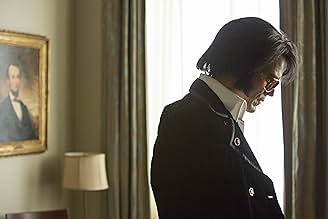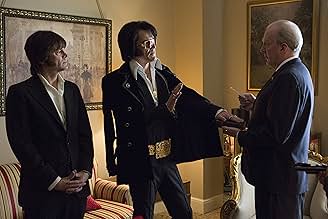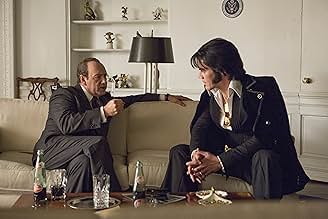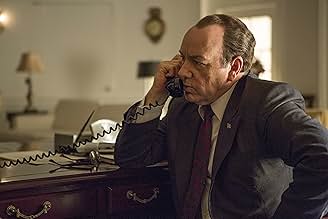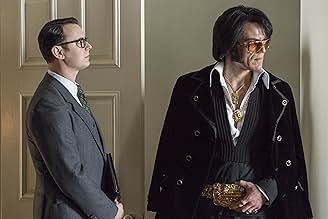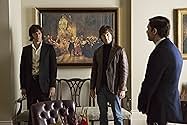Die unerzählte wahre Geschichte hinter dem Treffen zwischen Elvis Presley, dem King of Rock 'n Roll, und Präsident Richard Nixon, das zu dem aufschlussreichen, aber amüsanten Moment des Händ... Alles lesenDie unerzählte wahre Geschichte hinter dem Treffen zwischen Elvis Presley, dem King of Rock 'n Roll, und Präsident Richard Nixon, das zu dem aufschlussreichen, aber amüsanten Moment des Händeschüttelns führte, der in der am häufigsten angeforderten Photographie der National Archi... Alles lesenDie unerzählte wahre Geschichte hinter dem Treffen zwischen Elvis Presley, dem King of Rock 'n Roll, und Präsident Richard Nixon, das zu dem aufschlussreichen, aber amüsanten Moment des Händeschüttelns führte, der in der am häufigsten angeforderten Photographie der National Archives verewigt wurde.
- Regie
- Drehbuch
- Hauptbesetzung
- Auszeichnungen
- 2 Gewinne & 4 Nominierungen insgesamt
- Stewardess #3
- (as Skye Forsyth-Peters)
Zusammenfassung
Empfohlene Bewertungen
At only an hour and twenty five minutes, Elvis & Nixon is a rather short film that is based on a true story, but it doesn't feel like it. It takes a while for the film to get going as it decidedly focuses primarily on Elvis for the first 45 minutes or so leading up to the meeting. You get glimpses of Spacey's Nixon here and there but we don't get the two on screen together until nearly an hour in. I would have much rather watched a full hour and a half of these two guys talking to each other. The story of Elvis' friend Jerry Schilling or anybody inside the White House, I didn't care about.
I understand you need to at least follow the true story to a point, but no one truly know the events that went down that day, so you might as well structure it to the strengths of your film. No matter, the time spent on screen with the two leads is a joy to watch. They are far from an SNL impression as they both create their own distinct interpretations of Elvis and Nixon. Even if it's an extremely slow burn, the last 30 minutes are definitely worth watching. If only a better movie surrounded the two great performances.
+Two lead performances
+Entertaining final 30 minutes
-Extremely slow burn
-Focus on side characters
6.6/10
What matters, however, is how interesting and appealing Spacey and Shannon make the film's central characters. Although we find a way into their respective worlds by way of Colin Hanks' "Bud Krogh" and Alex Pettyfer's "Jerry Schilling." Schilling in particular, whose fingerprints are evident throughout the movie ("me and a guy named Elvis" is a line of dialogue at one point," this being the title of Schilling's autobiography) and who acts almost like an audience surrogate.
Schilling, who we first encounter working at Paramount Studios, is encouraged back "in" with Elvis as we are taken on a journey to the White House that's foreshadowed in our first glimpse of the man, himself. Watching Dr. Strangelove on one of his three televisions in a nicely recreated Graceland television room. But this isn't just a reference to one of Elvis's favourite movies, the scene from Kubrick's film that's used here foreshadows the nature and tone of his meeting with Nixon. No fighting in the War Room? How about karate in the Oval Office?!
Along the way, Shannon, who doesn't resemble Elvis but embodies the role with gestures small and grand, speech patterns, glances and a physicality that's undoubtedly been studied, becomes believable as Elvis. This isn't a caricature. The caricature is what Elvis actually became. Which is appreciated in the way he expresses concerns about his identity to Schilling, and in a touching monologue about his stillborn brother, Jessie Garon.
Shannon finds genuine nuance and pathos in Elvis. Although Liza Johnson's direction doesn't quite allow the excitement and elation of meeting Nixon to be juxtaposed with crushing lows or an indication of how such ultimately manifested itself in Elvis over subsequent years. We see him disappointed when things aren't going his way and when meeting Nixon seems lost at one point, but standing slumped and resigned isn't enough to encourage deeper sympathy for Elvis. Whilst the ultimate irony was missed in failing to depict his own problems with drugs.
As Nixon, Spacey also finds nuance and manages to make the former President larger than life from behind a desk and despite his reservations about meeting Elvis, and just about everything else. He has less to work with than Shannon, but Spacey gets Nixon just right and manages to refrain from caricature whilst exploring amusing traits and mannerisms. Both physical and psychological.
Beyond the two central characters, the screenplay and some variable stock footage encourages political and cultural touch-points that aren't dwelled upon. Although it's clear that Nixon isn't adverse to finding good PR opportunities or impressing his daughters. A trend that crops up throughout the movie, with Elvis using such as a free pass at his convenience. For him, good PR opportunities are also valuable.
In many ways, however, Elvis and Nixon suffer the same issues with loneliness, isolation and concerns about their image. Which is something Elvis is portrayed as being more in touch with than Nixon, who laments about not looking like a Kennedy and tries to boost his ego by asking Krogh if he could take Elvis in a fight. Elvis, on the other hand, is aware of his image and the performance that's required just to be Elvis Presley. Which is something that was also expressed by Michelle Williams' Marilyn Monroe in Simon Curtis' 2011 film, My Week With Marilyn.
By the time Elvis and Nixon eventually meet, both characters have been fully established, and whilst the vignettes along the way are both funny and geared towards comedy, some miss the mark completely. Such as a clandestine meeting between Elvis and Nixon's aides, that hints towards All the Presidents Men but plays more like a parents' meeting. Although Elvis's visit to a doughnut shop that's populated by a streetwise and vocal black clientele shows him comfortable with all walks of life and able to keep his ego in check.
This is in stark contrast to his meeting with Nixon, where Elvis is far from humbled and tries to impress upon the President with bizarre notions and one-upmanship. In one shot, Elvis seems to dwarf Nixon in the way both men are framed. But Spacey plays the President with quick wit and more than a little bemusement at what's in front of him. He sees what see in Elvis. But can't see that he's playing him for his own gain.
Unfortunately, the pacing and editing falters during the final act, with Schilling's personal dilemma of getting home to his girlfriend breaking the meeting up at one point. Whilst Evan Peters and Johnny Knoxville's Dwight Chapin and Sonny West, respectively, linger in thankless roles.
What's also noticeable is a lack of Elvis's music in the film's soundtrack, which is quite good regardless. Although Ed Shearmur's score is transparent and obtrusive at times. But Elvis & Nixon isn't about Elvis and his music. It's about a quest to find something fulfilling in his life. Which is expressed with profound sincerity in the way Michael Shannon plays Elvis. Getting under his skin and contrasting charisma and personality with a pensive nature and moments of uncertainty. It's a warm, affectionate and earnest performance in a movie that's skewed towards comedy, but has an acute understating of not only Elvis and Nixon, but celebrity and politics.
It would be pretty easy to bash the film as heavy on cheese and light on historical accuracy, but that would be missing the point. These two public figures couldn't have been much different from each other, but the script (Joey and Hanala Sagal, and Cary Elwes) finds a way to have these two icons hold a conversation bonding over their mutual hatred of The Beatles.
The terrific opening credit sequence perfectly captures the time period and is a work of art unto itself. We first see Elvis shooting out the picture tubes in the TV room at Graceland. He's disgusted with the news reports of Woodstock and drug use among America's youth. Constructing a loose plot to meet with President Nixon and offer his service as a Federal Agent-at-large, Elvis is mostly interested in adding a federal badge to his collection.
Michael Shannon plays Elvis and Kevin Spacey takes on the Nixon role. Rather than a finely tuned impersonation, Shannon goes after more of an impression or re-imagining of The King. It's a perfect fit for this setting, and there is nothing like watching Shannon give an impromptu karate demonstration for the leader of the free world in the most famous room in America. Spacey, on the other hand, is spot on in capturing the posture, mannerisms, sound and essence of a man who carried much personal baggage with his political power.
The chain of events leading up to the meeting plays a bit like a farcical comedy. Nixon's staff of Bud Krough (Colin Hanks), Dwight Chapin (Evan Peters) and HR Haldeman (Tate Donovan) is equal parts incredulous and opportunistic. We get two members of Elvis' "Memphis Maphia" with Alex Pettyfer playing Jerry Schilling and Johnny Knoxville adding even more humor as Sonny West. There is a nice blend of "little" comedy moments and outright laughers – Elvis impersonators confronting him in an airport, the Secret Service reaction to Elvis' gift to Nixon of collectible WWII pistols, and Elvis meeting with a DEA official played by Tracy Letts.
I found myself smiling throughout, with full understanding that this satirical look at a meeting between two famous men with little common ground has no real historical importance other than resulting in the all-time most requested photograph from the National Archives. But for 86 minutes of smiling, I say to the filmmakers and actors Thank you. Thank you very much.
Wusstest du schon
- WissenswertesBased on a true story. In December 1970, Elvis Presley met President Richard Nixon, who appointed Presley as an honorary DEA agent.
- PatzerIn the Oval Office: The Dr Pepper bottles logos are ten years ahead of their time.
- VerbindungenFeatured in Vecherniy Urgant: Olga Pogodina/Andrey Chernyshov (2016)
- SoundtracksHold On I'm Coming
Written by Isaac Hayes & David Porter (as Dave Porter)
Performed by Sam & Dave
Courtesy of Atlantic Recording Corp.
By Arrangement with Warner Music Group Film & TV Licensing
Top-Auswahl
- How long is Elvis & Nixon?Powered by Alexa
Details
- Erscheinungsdatum
- Herkunftsländer
- Offizielle Standorte
- Sprachen
- Auch bekannt als
- Elvis and Nixon
- Drehorte
- Produktionsfirmen
- Weitere beteiligte Unternehmen bei IMDbPro anzeigen
Box Office
- Bruttoertrag in den USA und Kanada
- 1.055.287 $
- Eröffnungswochenende in den USA und in Kanada
- 466.447 $
- 24. Apr. 2016
- Weltweiter Bruttoertrag
- 1.798.432 $
- Laufzeit
- 1 Std. 26 Min.(86 min)
- Farbe
- Seitenverhältnis
- 2.35 : 1







